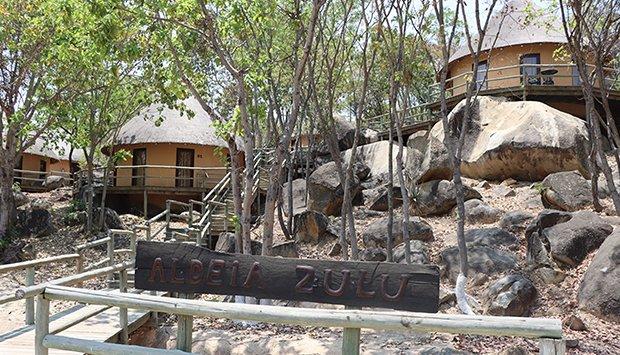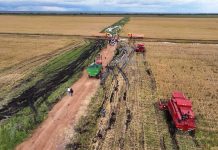Africa-Press – Angola. Thought out to the smallest detail, in the Mapunda district, on the outskirts of the city of Lubango, Huíla province, “secretly” hidden between the vegetation and the mountains, is the Pululukwa Resort
One of the most luxurious tourist developments in Angola, Pululukwa Resort is strongly committed to agricultural development in order to become increasingly sustainable. The resort is an audacious project, located in an area of more than 200 hectares, meandered by a river and shared with several lakes, in a perfect marriage with nature.
With a central restaurant, large outdoor spaces and breathtaking views, the accommodation offer comprises more than 60 bungalows located in three “villages” with different characteristics, connected by long walkways, sometimes in wood, sometimes in stone.
The project also foresees a pedagogical farm and spa. Animal settlement is already a reality. The Pululukwa Resort is, in fact, proof of the contribution that the province makes to the development of domestic tourism.
The managing director of that undertaking, Manuela Matos, explained to Jornal de Angola that the Pululukwa Resort continues to ensure the quality of its services, invest in the training of its employees and invest in agricultural development.
Sustainability
For those who visit the place, it can be seen that the Pululukwa Resort is focused on actions aimed at its self-sustainability, with the cultivation of cereals, vegetables and the settlement of fauna and flora.
Manager Manuela Matos said that self-sustainability essentially depends on the quality of the product that comes from “our” fertile soil, free from chemical products, which, in her view, is very pleasing to the consumer and the environment. the use of natural fertilizers, which are produced there.
The majority of visitors, regardless of whether they are nationals or foreigners, explained the general manager of the Pululukwa Resort, are amazed by the beauty of the landscape, the sight of wild animals that freely roam the space and also by the good taste and refinement of the decoration everywhere.
To make up for the lack of water in dry periods, at Pululukwa Resort, explained Manuela Matos, holes were drilled to capture this essential product.”With a collection of 5,000 liters/hour, we feed our agricultural areas, the flower gardens, animals and we proceed to the drip irrigation of our coffee trees, in a total of 5,700”, he said.
Visitors flock in droves
The influx of national and foreign tourists to Pululukwa is considered positive by the director-general. This “comforts us, both because of the work carried out in terms of restoration, as well as the service and reception and also the beautification of the space”, she said.
According to her, the ponds are being desilted to improve the quality of life of the fish and other animals that live there. Manuela Matos made it known that everything that is surplus from agricultural production at Pululukwa Resort is sent to charities in Lubango and other municipalities in the province.
Hotel unit
The lodges are grouped along the mountainside and are subdivided into three villages: Muholo, in honor of a type of trees existing in the province of Huíla; Zulu, which represents the largest tribe in South Africa; and Aldeia Madeirense, as there is a great influence of Portuguese from this region of Portugal in the province of Huíla.
The bungalows, round and equipped with A/C, cable TV, safe, minibar and telephone reflect creativity, comfort, good taste and refinement. The cobblestone accesses, interconnected by wooden and red earth pedestrians, surrounded by lakes, trees, gardens, flowers, grass and salalé hills are ideal spaces for long walks on foot or by bicycle and to enjoy the stunning natural vegetation.
Animal Reserve
A small reserve of wild animals, with most of them roaming freely through the resort, is an attraction that captivates any visitor. On a guided tour, our report verified the existence of zebras, oryx, fan goats, impalas, wild cows, ostriches, alligators, rabbits and bonnets, among others.
But it was the appearance of two zebras, born from a cross between a zebra and a donkey, that most captivated our curiosity and that of other visitors.
Flávio Justino, responsible for the outer area of Pululukwa, which includes agriculture, gardening, maintenance of resorts and the expanding part, said that gardening, afforestation and the implementation of new projects are proceeding smoothly.
Flávio Justino has been in service for seven years, informed that the expansion has allowed the plants to diversify, and coffee and citrus are now being planted. He pointed out that more than 5,000 coffee trees are already planted and that part of the harvest obtained from 80 kilograms of coffee is being served in the restaurant area. “350 pine trees were also planted on the uneven ground. Plantations are being done without evading nature and creating more green areas. We do not want to use artificial plants so as not to lose the green, which is the resort’s identity.”
Pines, eucalyptus, acacias, sages and jacarandas, planted to create boulevards, are plentiful. And there are also the approximately 800 avocado trees that produce every three years.
Two citrus orchards were created (orange, tangerine and lemon trees) where around 10 tons of fruit have already been harvested, in addition to the grape production area. carrot. Drip irrigation systems were installed in the orchards, depending on the water from the rivers, which in the meantime had lowered their flow due to the lack of rain. As an alternative, explained Flávio Justino, cisterns are used for watering and maintaining the plants until the start of the rains. Due to the lack of rain, the management of Pululukwa Resort is giving priority to the cultivation of products that resist drought, starting with cassava.
He said that there is enough land to plant more things and that the 500 mango trees are already producing. But the moringa orchard experience, she said, “was a failure due to the land.”
The Pululukwa is also increasing livestock production, with emphasis on the Boer goat cattle, with positive multiplication. About 100 goats of this species are controlled. The rearing of pigeons, turkeys, ducks and geese is a reality, as well as chickens of different types, with emphasis on bosch-vet chickens, which are also being disseminated in communities for better income. Employees also benefited from improved chickens. The project also includes giant black chickens.
At The Time Of Orders
The gastronomy served at the Restaurante dos Lagos, with 120 seats, enlivens the interest of any diner. There, the decor is elegant and the flavors of the land are highlighted. In the space reserved for the Wine Bar, you can taste the best international wines, taste local cheeses and sausages and enjoy a good cigar to the sound of live music. At Pululukwa there is also an exclusive library for guests.
Luis Salavisa’s Experience
Luís Afonso Salavisa, former commercial director of Coca-Cola and Ngola, was “refished” by the management of the Pululukwa Resort to put his experience into practice, towards the sustainability that is aimed at in that tourist resort. Salavisa defends the intensification of local production, to minimize costs. “We have a daily consumption, just to supply the poultry industry, of around 40 kilograms of feed”, he said, adding that it is being used to feed goats at this time, “as there is no corn, because of drought”, the alternative to dreche – barley waste -, a by-product of Ngola’s brewing production.
“As you can see, everything is dry, due to lack of water and, in order to maintain the orchards and vegetable gardens, the alternative has been water holes”, he lamented, stressing that the water tables are low.
Pululukwa, he said, has 12 boreholes, most of which cannot capture enough water. He explained that the two holes more than 160 meters deep each have been the salvation. “We have the rope around our neck, hence our prayers for water, because it is the third year that we have been in this condition”.
Citrus fruit and vegetable gardens with tomatoes, cabbage and cabbage are sufficient. Little or nothing is sold. “The objective is to avoid buying, to save money and provide quality food to our customers”, he said. He exemplified that more than 200 kilograms of reindeer potatoes have already been harvested. that, if there is space and the will to work, a lot can be done.
More than 40 people from the community collaborate in the field. And in addition to sales, everything that is surplus from the cultivation areas is offered to the community. “The objective is to create what is necessary for well-being and balance the balance of expenses. Pululukwa requires a lot of work and dedication”, guaranteed Luís Salavisa.
It All Started 10 Years Ago
The Pululukwa resort was opened on August 10, 2012, by the former Minister of Hospitality and Tourism Pedro Mutindi. The requalification and decoration project belongs to the architect Augusto Vasconcelos. In the nhaneca-humbi dialect Pululukwa means “Rest the body”. It was with this spirit that this serene, peaceful place was born, where the surroundings of nature work as therapy and make it the ideal place to rest, feel and dream.
Pululukwa Resort has an original family well-being concept, unique in its location, engaging in its ecological component, superb in its exotic and creative decoration. Its architecture is rustic, in stone, wood and thatch, where the ocher and earth colors are in perfect harmony with nature.
Managing director Manuela Matos explained to the report in Caderno Fim-de-Semana that the tourist resort belongs to Grupo Cosal, an Angolan company dedicated to the sale of vehicles, spare parts and oils and their derivatives, which decided to expand its action focusing on the hotel and tourism sector.
For More News And Analysis About Angola Follow Africa-Press






